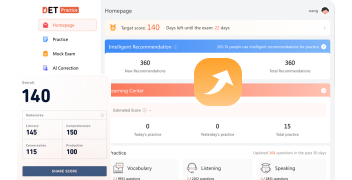Duolingo English Proficiency Test: Common Misconceptions and Strategies
The Duolingo English Test (DET) is an emerging online English proficiency assessment that's gaining traction due to its user-friendly nature, cost-effectiveness, and swift results delivery. However, test-takers new to this format might encounter some misconceptions. It's vital to identify and address these common misunderstandings to excel in the exam.
Misconception: DET is identical to conventional English tests like TOEFL or IELTS
Truth and Guidelines: Acknowledge DET's distinct features. Unlike traditional exams, DET employs an adaptive model, adjusting question difficulty based on the test-taker's performance. This dynamic structure necessitates a unique preparation strategy. Success hinges on practicing with questions of varying complexity, understanding that the test continuously calibrates as you progress.
Misconception: DET scores have limited recognition
Truth and Guidelines: Recognize the growing acceptance of DET scores. More than 5000 educational institutions and organizations across the world now recognize the Duolingo English Test (DET), and this figure is on the rise. This growing acceptance highlights the increasing significance and credibility of DET as a tool for evaluating students' readiness for academic pursuits. Educational establishments worldwide, spanning countries such as the United States, United Kingdom, Canada, Australia, and Ireland, now consider DET results as a valid measure of a student's English language capabilities.
Misconception: DET preparation can be compressed into a brief period before the exam
Truth and Guidelines: Dedicate adequate time for preparation. Although DET prep might be less time-consuming than traditional exams, it still demands substantial effort. The test's adaptive nature requires both foundational skill development and familiarity with specific question types. Effective preparation involves consistent practice over an extended period rather than last-minute cramming. Developing a study schedule, incorporating regular mock tests, and analyzing performance can significantly enhance exam readiness.
Misconception: DET preparation mirrors that of traditional English exams
Truth and Guidelines: Tailor your preparation specifically for DET. While general English proficiency is crucial, DET incorporates unique question formats. These include audio transcription, oral reading, and image description tasks. Mastering these specific formats is key to excelling in the exam. Regular practice with these distinctive question types is essential for familiarizing yourself with DET's unique requirements.
Misconception: DET has relaxed rules and regulations
Truth and Guidelines: Be cognizant of the stringent testing protocols. Despite being a home-based test, DET implements strict measures to ensure fairness and prevent cheating. Test-takers are monitored via webcam, and any suspicious behavior, such as averting gaze from the screen or attempting to use external resources, can result in disqualification. It's crucial to thoroughly review and adhere to all guidelines before the exam to avoid invalidating your results. Ensuring a quiet, well-lit, distraction-free environment is essential for a successful test experience.
Conclusion
In summary, while DET offers an innovative and efficient method of assessing English proficiency, it requires targeted preparation strategies. Understanding its adaptive nature, preparing for its unique question formats, and respecting its regulations are crucial for success. With proper planning and consistent practice, DET can serve as an effective tool for demonstrating English language skills to academic institutions worldwide.
Further Reading:
Duolingo Practice Test: How to Excel with Strategies, Tips, and a Comprehensive Mock Exam.
(A Comprehensive Guide to Tips and Practice for the Duolingo English Test.)
How to practice for the Duolingo English Test.
(An Article on How to Practice for the Duolingo English Test)





